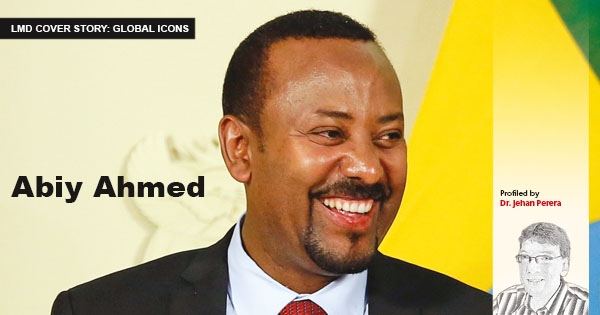Abiy Ahmed enjoyed widespread support in Ethiopia following his swearing in as Prime Minister and promises of reforms in 2018. In his first 100 days in office,he initiated several reforms including lifting the country’s state of emergency, granting amnesty to political prisoners, discontinuing media censorship, legalising outlawed opposition groups, and dismissing military and civilian leaders suspected of corruption. Under his leadership, the Ethiopian government announced that it would accept the terms of a peace agreement with Eritrea, for which he was conferred the Nobel Peace Prize 2019 “for his efforts to achieve peace and international cooperation.”
BACKGROUND
DATE OF BIRTH
15 August 1976
BIRTHPLACE
Beshasha (Ethiopia)
EDUCATION
BA degree from Microlink Information Technology College
MA degree from University of Greenwich
MBA from Ashland University
PhD from Addis Ababa University
HIGHLIGHTS
Nobel Peace Prize 2019 winner
Initiative to resolve the border conflict with Eritrea
QUOTE
Peace is not the absence of conflict – peace is an inviolable unity built on our common understandings
Abiy Ahmed
Q: In your opinion, what attributes have contributed to Abiy Ahmed’s ability to solve issues pertaining to peace?
A: The essence of being a peacemaker is to be just and fair to all sides.
Ahmed has been open-minded in reaching out to those whose stand is different from his; he has been willing to see their side of the problem and be open-minded with a willingness to cooperate within international norms of governance.
He’ll see some intractable challenges arise from the main Ethiopian ethnic group as he tries to realign the public from ethnic nationalism to civic nationalism where all parties are equal before the constitution and law.
This is proving difficult because the constitution isn’t as sacrosanct to the Ethiopian public as it is in countries such as the US. Nationalists who have long benefitted from their ethnic privilege have already claimed that he is ostensibly trying to consolidate his own power while shifting the public towards a fairer civic nationalism.
Q: How can aspiring Sri Lankan leaders champion peace similarly and create solutions for enduring societal issues?
A: Following Ahmed’s example, Sri Lanka’s solutions will need to be guided by the various international charters and covenants it has ratified – such as with the UN – and the world accepts as being the right framework for peace.
Similarly, we cannot solve our problems unilaterally; we must take on board the diversity of opinions from all parties and ethnic communities involved, while knitting all under a common agreement and understanding of the constitution.
In this regard, a Sri Lankan solution should follow a ‘sufficient majority consensus,’ which considers the main actors and communities involved. Those who are peace builders need to believe in their solutions and have the ability to win others over to them.
Jehan Perera
Executive Director
National Peace Council of Sri Lanka
[wprpw_display_layout id=3]





Leave a comment